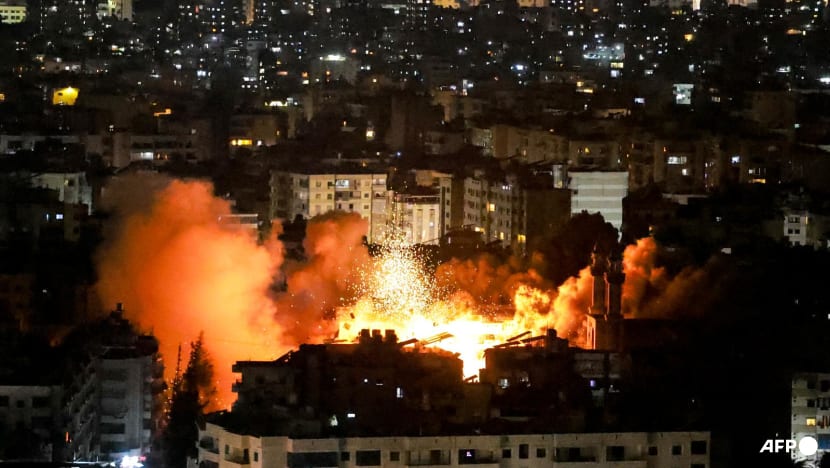Israel strikes Beirut, targeting Hezbollah drone factories

Smoke and fire erupt from the site of an Israeli airstrike on Beirut’s southern suburbs on Jun 5, 2025. (Photo: AFP/Ibrahim Amro)
BEIRUT: A series of Israeli air strikes hit Beirut's southern suburbs on Thursday (Jun 5) night, after the military said it would target underground Hezbollah drone factories.
Plumes of smoke were seen billowing from the Lebanese capital, shortly after huge numbers of people had fled the area, clogging the roads with traffic.
Lebanese news agency ANI said it counted nearly a dozen strikes, including two which were "very violent". AFP journalists in the city heard at least two strong detonations.
"The IDF (military) is currently striking terror targets of the Hezbollah aerial unit," the Israeli military said in a statement on Telegram.
Less than two hours earlier, its Arabic-language spokesman Avichay Adraee had warned on social media that residents of the suburbs were "located near facilities belonging to the terrorist organisation Hezbollah" and should evacuate immediately.
In a separate statement, the military had said it would "soon carry out a strike on underground UAV (drone) production infrastructure sites that were deliberately established in the heart of (the) civilian population" in Beirut.
The United Nations Special Coordinator for Lebanon wrote on X that the strikes "generated renewed panic and fear", and called for a "halt to any actions that could further undermine the cessation of hostilities".
"Established mechanisms and diplomatic instruments are at the disposal of all sides to address disputes or threats, and to prevent unnecessary and dangerous escalation," it added.
Lebanon's President Joseph Aoun in a statement voiced "firm condemnation of the Israeli aggression" and "flagrant violation" of a Nov 27 ceasefire "on the eve of a sacred religious festival", the Muslim holiday Eid al-Adha.
He said the strikes were "irrefutable proof of the aggressor's refusal ... of a just peace in our region".
Prime Minister Nawaf Salam also issued a statement condemning the strikes as a "flagrant violation of Lebanese sovereignty" and of a 2006 UN resolution.
SUSPECTED DRONE PRODUCTION
One resident described grabbing her children and fleeing her home in the southern suburbs after receiving an ominous warning before the strikes.
"I got a phone call from a stranger who said he was from the Israeli army," said the woman, Violette, who declined to give her last name.
Israel also issued an evacuation warning for the village of Ain Qana, located in southern Lebanon around 20km from the Israeli border.
The Israeli military then launched a strike on a building there that it alleged was a Hezbollah base, ANI reported.
Israel and the Iranian-backed Hezbollah engaged in more than a year of hostilities that began with the outbreak of the Gaza war and culminated in an intense Israeli bombing campaign and ground incursion into southern Lebanon.
The November ceasefire sought to end the fighting - which left Hezbollah severely weakened - but Israel has continued to regularly carry out strikes in Lebanon's south.
Strikes targeting Beirut's southern suburbs, considered a Hezbollah stronghold, have been rare, however.
"Following Hezbollah's extensive use of UAVs as a central component of its terrorist attacks on the state of Israel, the terrorist organisation is operating to increase production of UAVs for the next war," the military statement said, calling the activities "a blatant violation of the understandings between Israel and Lebanon".
Under the truce, Hezbollah fighters were to withdraw north of the Litani river, about 30km from the border, and dismantle their military posts to the south.
Israel was to pull all its troops from Lebanon, but it has kept them in five positions it deems "strategic" along the frontier.
The Lebanese army has been deploying in the south and removing Hezbollah infrastructure there, with prime minister Salam saying Thursday that it had dismantled "more than 500 military positions and arms depots" in the area.














